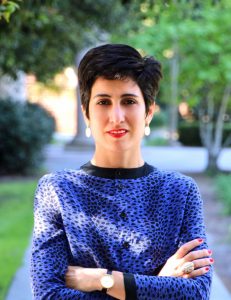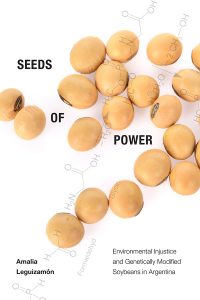Evergreen’s Climate Justice and Resilience Speaker and Event Series is centered on the Climate Academy program, and is hosted by multiple programs that study climate themes. All students, faculty, staff, and the general public are invited to join these events on Zoom. Announcements of speakers and events, ways to access the online events, and background links and documents, will be posted here. Soon after each event is over, videos will also be posted on the quarterly speaker series pages. Many thanks to Evergreen Media Services staff for their hard work in making this remote series possible.
The speaker and event series builds on the Anthropocene series (2015-16), two Indigenous Climate Justice Symposia (2015-17), the “Water is Life” forum (2017), “The Waters Connect Us” forum (2018), the “Nurturing Roots” forum (2019), and other collaborative events at Evergreen. The speakers and events listed below are part of the 2020-21 series:
Fall 2020 Speaker Series
SEPT. 27: Fall Convocation Panel on Disaster Resilience
OCT. 27: Dr. Michael Méndez, author of Climate Change from the Streets
NOV. 10: Dr. Kyle Whyte, Indigenous climate scholar, U. of Michigan
NOV. 18: Professor Lane Selman, Culinary Breeding Network
FALL WEEK 9: Evergreen Prof. Pauline Yu, on Climate Change and Aquaculture
Winter 2021 Speaker Series
JAN. 25: Evergreen Prof. Ruth Hayes, on “Eco-Media; the Environmental Footprint of Media and the Myth of the Cloud”
FEB. 6: Sámi Perspectives on Green Colonialism: Response to Climate Change (Sámi National Day)
FEB. 8: Prof. John Bolte, on Climate Resilience Modeling
FEB. 20: Toshi Reagon on Parable of the Sower opera
FEB. 24: Evergreen Prof. Shangrila Joshi, on “Climate Justice in Global Context”
SPRING 2021 SPEAKER SERIES (details below)
SPRING WEEK 1: Julie Barber (Swinomish Tribe Senior Shellfish Biologist) & Amanda Kelley (UA-Fairbanks Ocean Acidification Research Center)
APR. 14: Zoltán Grossman, Alex McCarty, and Conceptualizing Place students presenting publication on removing barriers to salmon runs
APR. 24: José Gómez Farmworker Justice Day / “Farmworkers’ response to COVID-19 and wildfire danger using multigenerational movement organizing as an ‘ecosystem'”
MAY 12: Prof. Amalia Leguizamón on “Environmental Injustice and Genetically Modified Soybeans in Argentina”
MAY 13: Rob Smith (U.S. Forest Service) on “Climate Change Modeling With Lichen Communities”
MAY 26: Evergreen Emeritus Prof. Jeff Antonelis-Lapp, with “A Virtual Field Trip in the Nisqually River Watershed”
Shellfish and Ocean Acidification
Spring quarter (forthcoming)
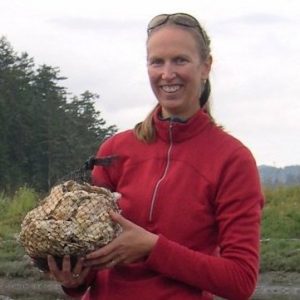
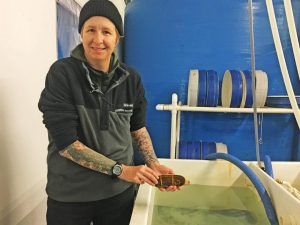
Evergreen Prof. Pauline Yu will be in conversation with Julie Barber, Senior Fisheries Biologist for the Swinomish Tribe (left) and Amanda Kelley, School of Fisheries and Ocean Sciences at the University of Alaska – Fairbanks (right).
Julie Barber is a Senior Shellfish Biologist for the Swinomish Indian Tribal Community. Amanda Kelley is an Assistant Professor in the School of Fisheries and Ocean Sciences at the University of Alaska – Fairbanks, and Co-Director of the Ocean Acidification Research Center at UAF.
Pauline Yu is in her seventh year as faculty at Evergreen in the Environmental Studies curriculum pathway, and is currently both providing faculty co-supervision of the Evergreen Shellfish Garden and also co-teaching Experiments in Photography: Science + Art. See also the fall 2020 recording of Pauline Yu in conversation with student/alum leaders of the Evergreen Shellfish Garden.
Talk available soon for spring quarter; link TBA.
“Conceptualizing Place” publication on Removing Barriers to salmon runs
Equity Symposium,
Wednesday, April 14, 2021
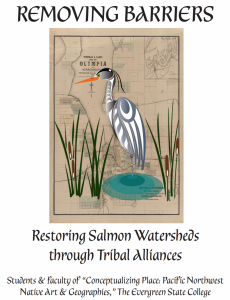
In Fall 2020-Winter 2021, students in the “Conceptualizing Place: Pacific Northwest Native Art and Geographies” daytime program at (Zoltán Grossman and Alexander McCarty, faculty) produced a 135-page publication about barriers to salmon runs, notably dams, dikes, and culverts, and how tribal nations have led alliances to remove some of the barriers in order to restore salmon habitat in Northwest watersheds. Removing Barriers: Restoring Salmon Watersheds through Tribal Alliances will be available for download in late May 2021.
The place-based stories of habitat restoration highlight how treaty rights and tribal sovereignty have become leading drivers of reversing damage wrought by settler colonialism, and how the healing of the watersheds and their estuaries is made possible by a process of decolonization and reindigenization in corresponding Indigenous homelands.
In Removing Barriers: Restoring Salmon Watersheds through Tribal Alliances, narratives of the watersheds are told through text, graphics, and students’ 42 original digital artworks and maps, as students simultaneously learned Northwest Native histories, geographies, and art styles. Under the remote supervision of faculty (artist Alexander McCarty and geographer / cartographer Zoltán Grossman), individual students produced Adobe Illustrator artwork and maps in fall quarter, and student teams produced the Adobe InDesign layouts in winter quarter. Media Services staff offered their invaluable training and assistance.
Students’ twelve chapters highlighted the Nisqually, Elwha, Skokomish, Chico, White Salmon, Nooksack, White, Deschutes, Chehalis, Klamath, and Snake watersheds, as well as background on dams and climate change, and their effects on Pacific salmon, orcas, and coastal communities. The book’s theme of “removing barriers” applies to the barriers to salmon runs, barriers between human beings and the natural world, barriers between Native and non-Native communities, and barriers to Indigenous self-determination.
Removing Barriers will be available here for download in late May 2021. This 49-minute minute presentation by faculty and students was at Evergreen’s annual Equity Symposium. https://www.youtube.com/watch?v=uhnL2CtISYQ
Farmworkers’ response to COVID-19 and wildfire danger using multigenerational movement organizing as an “ecosystem”
José Gómez Farmworker Justice Day, Wednesday, April 21, 2021
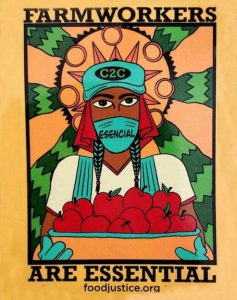 On José Gómez Farmworker Justice Day 2021, hear voices from the Washington farmworker movement: Essential Workers Organizing in the Pandemic. Learn about farmworkers response to COVID-19 and wildfire danger using multigenerational movement organizing as an “ecosystem,” with speakers from Community to Community Development (C2C), Familias Unidas para la Justicia (FUJ), and Trabajadores Unidos por la Justicia (TUJ).
On José Gómez Farmworker Justice Day 2021, hear voices from the Washington farmworker movement: Essential Workers Organizing in the Pandemic. Learn about farmworkers response to COVID-19 and wildfire danger using multigenerational movement organizing as an “ecosystem,” with speakers from Community to Community Development (C2C), Familias Unidas para la Justicia (FUJ), and Trabajadores Unidos por la Justicia (TUJ).
Sponsored by Evergreen Artists Lecture Series, Academic Programs, President’s Equity Fund, Center for Community-Based Learning & Action (CCBLA), and the Climate Justice and Resilience Speaker Series.
Zoom recording: https://www.youtube.com/watch?v=1yR8N6GB5RA
Tulane Prof. Amalia Leguizamón on “Environmental Injustice and Genetically Modified Soybeans in Argentina”
Wednesday, May 12, 2021
Amalia Leguizamón is Associate Professor of Sociology at Tulane University, where she is also a core faculty member at the Stone Center for Latin American Studies and a member of the Environmental Studies Faculty Advisory Committee. Her talk is hosted by the “Community Food Systems” program (Prita Lal).
Dr. Leguizamón’s research work encompasses the political economy of the environment, with a regional focus on Latin America. Her book, Seeds of Power: Environmental Injustice and Genetically Modified Soybeans in Argentina (Duke University Press, 2020) tells the story of Argentina’s swift agrarian transformation based on the early adoption and intensive implementation of genetically modified soybeans.
Recording link: https://www.youtube.com/watch?v=ZWQ6rJEGcDI
Dr. Rob Smith (U.S. Forest Service) on “Climate Change Modeling With Lichen Communities”
Thursday, May 13, 2021
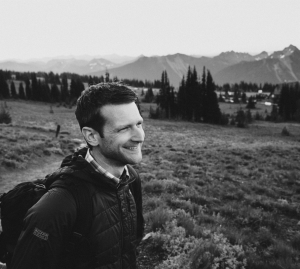
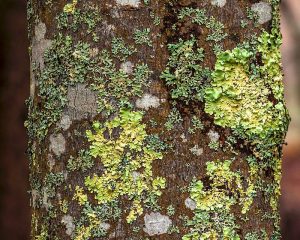
Dr. Robert Smith is a forest ecologist and ORISE Fellow with the US Forest Service’s Air Resource Management Program in Washington, DC. He aims to guide forest management by forecasting vegetation responses to pressing global changes, especially where atmospheric stressors and disturbances intersect. Rob’s work lies at the broad intersection of forest ecology, biogeography and high-dimensional statistics. He contributes to the National Atmospheric Deposition Program, an interagency cooperative which tracks atmospheric conditions and their environmental effects. Previously he was a researcher with the USFS Forest Inventory and Analysis program in the Pacific Northwest, and he taught botany courses at Oregon State University after earning his PhD there with a focus on detection and prediction of climate signals using lichen bioindicators. For a decade he worked in construction, mills, landscaping, and mountaineering
Dr. Smith’s talk is hosted by the “Field Plant Taxonomy and Biodiversity Conservation” program (Lalita Calabria & Frederica Bowcutt).
Recording link: https://www.youtube.com/watch?v=e52EPd_Ix-M
Evergreen emeritus Prof. Jeff Antonelis-Lapp with “A Virtual Field Trip in the Nisqually River Watershed”
Wednesday, May 26, 2021
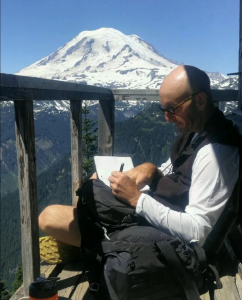
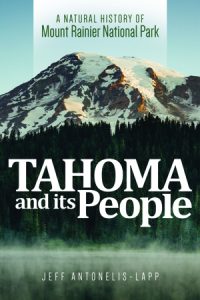
Jeff Antonelis-Lapp taught writing and Native American Studies on western Washington Indian reservations for The Evergreen State College for 10 years before teaching environmental education, natural history, and writing on campus until 2015. Prior to that, he held several positions in adult and continuing education for the Muckleshoot Indian Tribe, and was a classroom teacher. He holds an M.Ed. in science education from the University of Washington. Jeff is the author of Tahoma and Its People, a natural history of Mount Rainier National Park, which was published by Washington State University Press in 2020.
After graduating from college, Jeff worked two summers at Mount Rainier National Park, igniting a connection to the mountain that endures today. He has summited the mountain, hiked all of its mapped trails, and completed the 93-mile Wonderland Trail five times.
Jeff began writing Tahoma and Its People after being unable to find a current natural history for a course he planned to teach at Evergreen. He conducted over 250 days of fieldwork for the book, many of them in the company of park archaeologists, biologists, and geologists.
Jeff’s talk, A Virtual Field Trip in the Nisqually Watershed, begins with the original inhabitants, the Squalli-Absch, “The People of the River, the People of the Grass.” We then travel the length of the watershed from the Nisqually Glacier’s origin at the summit of Mount Rainier, continuing as the Nisqually River to its runout into Puget Sound at Billy Frank Jr. Nisqually National Wildlife Refuge. The talk focuses on some of the watershed’s 78 river miles of natural history stories and some of its groundbreaking restoration projects. Washington State University Press published Jeff’s natural history of Mount Rainier National Park, Tahoma and Its People, in 2020.
This talk is hosted by the “Reimagining Community Safety” program (Eirik Steinhoff).
Link to recording: https://youtu.be/Ngf69mryKrE

